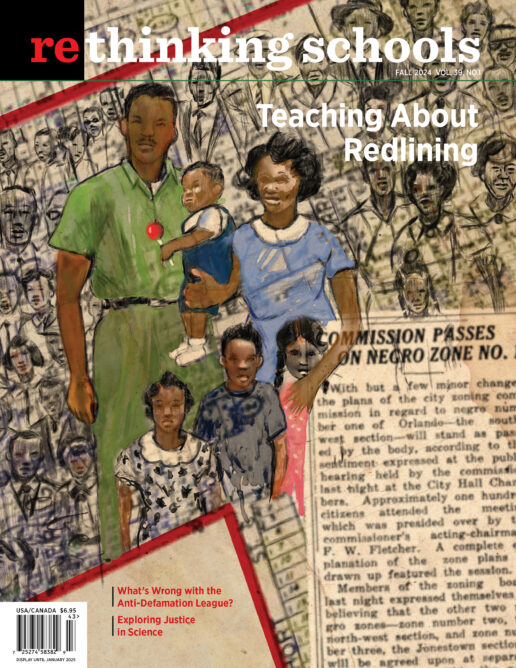Election Myths and Movement Hopes

Editors’ note: Rethinking Schools is a 501(c)(3) nonprofit, and by law cannot endorse candidates for public office. But elections matter for educators. We offer this editorial consistent with our mission to “encourage grassroots efforts in our schools and communities to enhance the learning and well-being of our children, and to build broad democratic movements for social and environmental justice.”
U.S. presidential elections are wrapped in myths about “democracy” that mask a profoundly undemocratic system.
In free elections, we’re told, the candidate with the most votes wins. But not in U.S. presidential elections. The electoral college, originally designed to inflate the voting power of slave states, makes a mockery of “one person, one vote.” Five times the candidate with the most votes lost, most recently in elections that led to the Iraq war and Trump’s first term.
In free elections, every citizen gets an equal chance to vote. But not in U.S. presidential elections. The Voting Rights Act, the high point of the Civil Rights era’s struggle to create a multiracial democracy, has been hollowed out by a corrupt, unelected Supreme Court and its renewal blocked by the filibuster, where senators representing just 21 percent of the population can kill a bill.
In free elections, voters receive honest and reliable information about the candidates and their policies. But not in U.S. presidential elections. The nation’s largest “news” network, Murdoch’s Fox News, recently paid $787 million for lying about the last election, and is already lying about the next one.
In free elections, the power of big money and corporate media can be checked to promote open debate among the citizenry about the kind of society we want and the kind of future we want for our children. But not in U.S. presidential elections. In its Citizens United decision, the Supreme Court made serious campaign finance reform impossible. More recently, the Court, which has no enforceable ethics code of its own, essentially legalized bribery.
And of course, in free presidential elections, the winner leads the country under the banner of the U.S. Constitution, where “no person is above the law.” The Court’s recent immunity decision exposed that myth too.
These myths are not just falsehoods, they are political strategies. As author Ari Berman sums up in his new book, Minority Rule:
To entrench and hold on to power, a shrinking conservative white minority is relentlessly exploiting the undemocratic features of America’s political institutions while doubling down on a wide variety of antidemocratic tactics, such as voter suppression, election subversion, dark money, legislative power grabs, immigration restrictions, census manipulation, and the whitewashing of history.
In short, U.S. presidential elections are rigged, not in the way MAGA fever dreams imagine, but in fundamental, structural ways that make them undemocratic and under-representative of majority opinion.
Still, for all the myths and propaganda, presidential elections have real stakes for people’s lives. This seems especially true this year.
Project 2025, a 900-page book of horrors prepared by the Heritage Foundation as a blueprint for Donald Trump’s second term, promises a special brand of hell for schools. Its agenda includes universal school vouchers, with subsidies for those already attending private schools, and eliminating the Department of Education, especially the Office for Civil Rights. Title I and Head Start, the two largest federal ed programs serving children in poverty, would be eliminated. (The Trump campaign insists that “Project 2025 had nothing to do with the campaign, did not speak for the campaign, and should not be associated with the campaign or the president in any way.”)
Project 2025 also seeks to end public health mandates for childhood vaccines, which would not only feed the resurgence of measles outbreaks, but could also bring back polio.
Plyler v. Doe, the 1982 court decision that gave undocumented immigrant children the right to attend public school, would disappear. Instead, a nationwide military dragnet would hunt down immigrants and turn every school into a battleground.
Project 2025’s culture war agenda includes banning books and truthful teaching about race, gender, and the country’s history. Instead of tenure, teachers would need to show that they “embrace patriotic values” to be certified. Gender-affirming care for trans kids would be banned (as it already has been in 25 states). Names and pronouns would be legally required to match birth certificates. All schools that receive federal funds would be required to administer the Armed Services Vocational Aptitude Battery (ASVAB) — the military entrance examination — to all students.
And the Democrats? The centrist and neoliberal forces that have controlled the Democratic Party for the past four decades have for the most part offered unpopular candidates and policies committed to the economic and racial status quo, corporate supremacy, and budget austerity.
The Democrats’ historic role has been to contain and channel social protest, not lead it.
During a period when the Republican Party was rejecting the very premises of the New Deal and the Civil Rights era, Democrats have continued to promote mythical notions of “bipartisanship” and “national unity.” 9/11 and the Iraq war saw both parties double down on imperial foreign policy and military spending without limits. Corporate and financial power grew off the charts. Since 2000, the billionaires at the top of the U.S. economy have grown nine times richer. Three of them (Bezos, Gates, and Buffet) now own as much wealth as the bottom 50 percent of the population. All of this occurred during 24 years when each party held the White House for 12 years.
The massive growth of income inequality and acute climate crisis have sparked new progressive grassroots movements full of hope and potential (e.g., Occupy, Sunrise, the youth-led March for Our Lives). But the centrist corporate Democrats who control the party’s electoral and congressional agendas largely resisted their rise. It’s worth remembering that the fading presidential candidacy of Joe Biden was resurrected during the 2020 primaries to stop the rise of Bernie Sanders, not to defeat Trump. The Democrats’ historic role has been to contain and channel social protest, not lead it.
The rise of labor and social movements, Sanders’ populist campaigns, and the economic crisis precipitated by the COVID pandemic did help break decades of federal budget austerity. And some of that momentum carried over into Biden’s presidency. There was progressive movement on student debt, climate investment, support for labor — all in response to mass social struggle.
But Joe Biden was never a progressive politician. In his early years, he played divisive racial politics around school busing and bragged of his friendships with segregationists. As chairman of the Senate Judiciary Committee, he helped put Clarence Thomas on the Supreme Court, was an architect of the policies that produced mass incarceration, and supported the Iraq war. Aside from his physical and verbal decline, Biden’s biggest liability as a candidate was his blank check support for Israel’s criminal war in Gaza. Once he embraced and continued to pursue the policies that earned him the moniker “Genocide Joe,” Biden was never going to lead the Democratic Party to victory.
Harris’ substitution for Biden has injected energy into the campaign. Black people in general, and Black women in particular, have always been the keys to forward movement in U.S. politics. But Kamala “memes” and “vibes” will not turn the Democratic Party into a champion of social justice.
Educators have special reason to be wary. The Democratic record on ed policy has often been terrible: generally better than Republicans on funding, but frequently horrible on privatization and testing issues. Obama’s Education Secretary, Arne Duncan, and his “Race to the Top” were a disaster. Under both the Obama and Biden administrations, charter and voucher privatization exploded, often with Democratic support or complicity. The right-wing takeover of the courts, which Democrats have done too little to combat, has also eroded church/state protections and opened multiple ways to send public funds to private schools.
At this writing, Harris has not issued any specific education proposals. She has spoken generally about the importance of “public schools” and her support for labor and unions. Her first major speech upon becoming the apparent Democratic nominee was at the American Federation of Teachers convention, which gave her her first union endorsement. Vice presidential nominee Tim Walz has a 20-year history as a public school teacher and a generally pro-public education record as the governor of Minnesota.
But on education — as with every other issue — what the Democrats do if they win will depend on how hard they are pushed from below.
The demonstrations to end the war on Gaza and build the movement for peace and justice in Palestine will continue throughout the fall. Educators of conscience should support them while continuing to build the movements around women’s rights, reproductive freedom, climate justice, labor and union rights, LGBTQ+ rights, and Black Lives Matter and the other movements that hold the key to a better future. That future cannot be won through a fundamentally undemocratic electoral system. What the country needs is the broadest possible grassroots mobilization in support of social justice, one that flourishes long beyond Election Day — a movement that can block the right while building for a future that doesn’t rely on the political parties of the past. Both tasks are possible, but time is running out.

